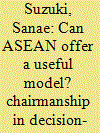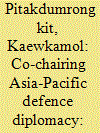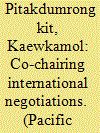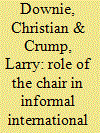|
|
|
Sort Order |
|
|
|
Items / Page
|
|
|
|
|
|
|
| Srl | Item |
| 1 |
ID:
180648


|
|
|
|
|
| Summary/Abstract |
ASEAN has adopted decision-making by consensus. Taking ASEAN as a case study, this article aims to explain how competing positions are reconciled and international agreements reached in organisations that have adopted consensus, a process that risks non-agreement because each participant has veto power, as their sole decision-making rule. ASEAN roundtables with the foreign ministers of its member states have indeed generated some meaningful agreements. I argue that rules and customs associated with ASEAN chairmanship effectively comprise a reconciliation mechanism. The chair is empowered to play an agenda-setting role, and the combination of rotating chairmanship and a limited number of member states means that every state will enjoy the strong power, within a reasonably short period of time. Since each state knows that its turn will come soon, all are willing to allow the others to exert the power of the chair and guide consensus toward agreements that are consistent with the chair’s national interests. This article analyses the impact of a strong ASEAN chair via empirical case studies of decisions reached (or not) under consensus regarding issues where member states had conflicting interests. This analysis of ASEAN decision-making contributes to the ongoing debate on effectiveness of ASEAN and has theoretical implications for the understanding of international organisations that operate under similar institutional settings.
|
|
|
|
|
|
|
|
|
|
|
|
|
|
|
|
| 2 |
ID:
170264


|
|
|
|
|
| Summary/Abstract |
This article assesses co-chairs’ roles in affecting the outcomes of Asia-Pacific defence diplomacy, which have been under-examined. Attempting to mend this intellectual gap, our study examines: ‘What shapes specific agreement details?’ We contend that co-chairs’ effectiveness is not borne out of resource possession but in fact derived from their ability to manage the resources. In order to be effective, co-chairpersons must convert the available resources at hands into bargaining leverage. To validate our argument, empirical analysis of military medicine (MM) collaboration under the ASEAN Defence Ministers’ Meeting Plus (ADMM-Plus) framework was conducted. We demonstrate how the Thai and Russian co-chairs altered the bargaining dynamics to shape the outcomes regarding the ASEAN Center of Military Medicine (ACMM). Insights from our analysis not only extends the existing academic literature on Asia-Pacific defence diplomacy and international negotiation, but also provides practitioners with lessons useful for conducting defence diplomacy and enhancing security cooperation in the Asia-Pacific and beyond.
|
|
|
|
|
|
|
|
|
|
|
|
|
|
|
|
| 3 |
ID:
141624


|
|
|
|
|
| Summary/Abstract |
This paper studies the roles of co-chairs in international negotiations. This study attempts to fill the research gap by scrutinizing co-chairs' effectiveness, defined as an ability to shape agreement details in one's direction, to better understand chairs' and co-chairs' influence in negotiations. I argue that a co-chair's effectiveness is not a function of resource possession, but is rooted in its resource management, or ability to convert the existing resources into bargaining influence. To validate my argument, I analyze the Chiang Mai Initiative Multilateralization (CMIM) negotiation rounds from 2005 to 2010, focusing on the members' financial contributions and vote shares.
|
|
|
|
|
|
|
|
|
|
|
|
|
|
|
|
| 4 |
ID:
139393


|
|
|
|
|
| Summary/Abstract |
High issue salience and controversy negatively affect the probability of success of multilateral negotiations. In such a context, Chairpersons acquire an important role in agenda management and brokerage among the bargaining partners. If they perform these functions neutrally and impartially, Chairs increase their effectiveness and emerge as key determinants of negotiation success. However, Chairs as agents often seek some degree of autonomy to pursue their own interests. We expect high issue salience and controversy to create a non-conducive environment for Chairs to follow their own agenda, due to greater principals’ sensitivity, thus leading any such autonomy-seeking attempt to failure. We discuss four case studies of negotiations taken from the un setting, in which Chairs sought autonomy in a highly polarized and controversial bargaining environment. Whereas in the first two cases, the Chairs’ attempts ended in failure confirming our basic hypothesis, in the latter two cases the Chairs were successful.
|
|
|
|
|
|
|
|
|
|
|
|
|
|
|
|
| 5 |
ID:
155441


|
|
|
|
|
| Summary/Abstract |
Scholars of international relations have devoted significant effort to understanding international organisations. However, two areas have been understudied: the role of the chair in international multilateral negotiations and the role of informal international organisations. Yet informal international organisations are increasingly important in international affairs as world leaders turn to smaller and more flexible forums to address global challenges. This article addresses these two blind spots in the literature by considering the role of Australia as chair in one of the most important yet most understudied informal international organisations: the Group of Twenty (G20). Drawing on primary interview data and the participant observations of the first author, who was a member of the G20 chair in 2013–14 during Australia’s presidency, the authors examine two theoretical puzzles: (1) why states delegate control of the negotiation process to a chair and (2) how the chair can, and does, influence the negotiation process. It is argued that member states delegate control to the chair to overcome specific institutional failures and, in doing so, provide the chair with the power to influence the negotiation process. The authors also argue that the G20 case indicates that existing theory overlooks key factors which restrict the capacity of the chair to influence the negotiation outcome.
|
|
|
|
|
|
|
|
|
|
|
|
|
|
|
|
|
|
|
|
|